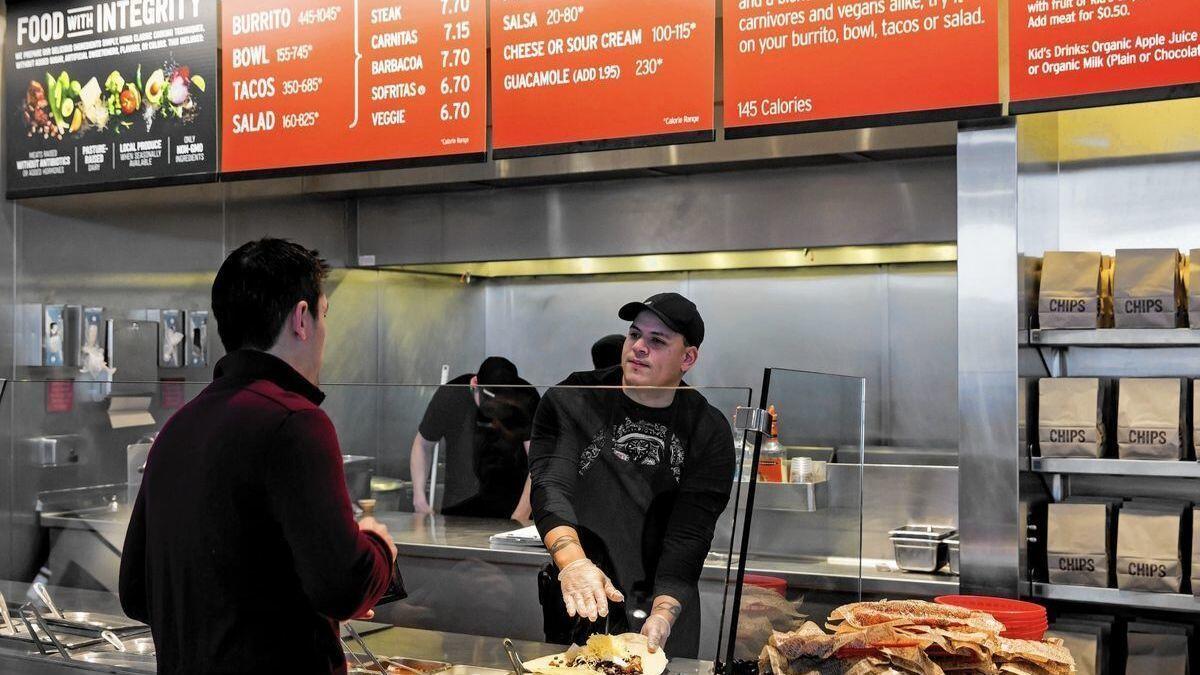Column: Chipotle may have outsmarted itself by blocking thousands of employee lawsuits over wage theft

Fast-food companies accused of nickel-and-diming their workers through wage theft? That’s become almost a dog-bites-man story in today’s workplace environment. The same companies forcing the workers to bring their claims in arbitration rather than taking them to court? Ditto.
But here’s a story about a fast-food company that appears to have outsmarted itself in fending off thousands of wage-theft claims. The company is Newport Beach-based Chipotle Mexican Grill, which owns more than 2,300 restaurants spanning the U.S.
Chipotle has been fighting claims of wage theft lodged in federal court by current and former workers since July 2013, with the army of plaintiffs having grown to about 10,000 strong. Back in August, the company won a major victory by persuading a federal judge in Denver to eject more than 2,800 of those workers from the court proceedings because they had signed an agreement to bring their claims only via arbitration.
We didn’t ask for this. Chipotle asked for it.
— Kent Williams, attorney handling hundreds of arbitration claims against Chipotle
But was it really a victory? As a result of the judge’s ruling, Chipotle could be facing thousands of individual arbitration cases spread across the country, almost all the expenses of which it may have to shoulder itself — potentially tens of thousands of dollars per case. Already 150 arbitrations have been filed by workers.
“We didn’t ask for this,” says Kent Williams, a Minnesota attorney directly representing hundreds of plaintiffs. “Chipotle asked for it.”
Now Chipotle is squealing for mercy. In November, the company pleaded that the tide of arbitrations could cause it “irreparable harm” and asked Judge John L. Kane of Denver, who is presiding over the federal case, to suspend the filings — and also to disqualify Williams and other attorneys involved in the lawsuit from representing any of the workers in arbitration.
Kane denied both motions as merely the latest in a series of maneuvers by the company to throw sand in the gears of justice. “Chipotle’s attempts to delay and obfuscate the claims of the Arbitration Plaintiffs,” he declared, “are unseemly.” He described the company’s strategy as “congesting the federal courts with countless appeals to prolong arbitration proceedings.” Those activities make a mockery of the supposed superiority of arbitration over lawsuits, its purported efficiency.
As we’ve reported before, however, forced arbitration clauses are a scourge whenever they pit powerful parties, such as corporations, against the relatively powerless, such as employees or consumers: The big players are almost invariably favored by a venue that was designed for their benefit.
That’s why it was considered a victory for civil rights in 2014 when President Obama signed an executive order banning companies with federal contracts worth more than $1 million from forcing workplace discrimination, sexual assault or sexual harassment complaints into arbitration. The Consumer Financial Protection Bureau also had implemented a rule barring banks and credit card companies from writing mandatory arbitration clauses into their consumer agreements, starting this year.
You probably know the punchline: The Trump administration and Republican Congress have overturned both regulations, as gifts to workplace harassers and Wall Street bankers.
That brings us back to Chipotle. Long ago, its wage-theft case turned into one of those that try judges’ patience in a big way. In August 2015, Judge Kane observed that federal court technicalities and Chipotle’s inclination to file repeated motions over points he already had decided had rendered its procedural history “tortuous, and uniquely so.” He tried then to “put a stop to the procedural folderol and get this case on track,” since the workers’ wage claims already had been filed “for more than two years without ever getting out of the gate.” But the folderol has continued.
The employees’ allegations are simple enough. They say that Chipotle restaurant managers systematically required them to work unpaid duty through methods that included clocking them out before their shifts ended. The company’s time clocks also were configured to reset once a day, typically at 12:30 a.m., automatically clocking out any employees who were still on the job. The plaintiffs’ claims for back pay range from about $100 to several thousand dollars, Williams says.
The case was working toward class-action certification until sometime in 2015, when Chipotle revealed that it had instituted an arbitration provision for new hires starting in August 2014.
Chipotle almost certainly thought its arbitration provision would function as a moat against worker claims. The provision requires employees with work-related legal complaints to bring them only as individuals, not in class or collective actions, and only in front of arbitrators, not in court. It also requires that the arbitrations take place in the county of the last Chipotle restaurant where the employee worked.
As is typical with arbitration clauses, many workers don’t even recall signing it. The clause was buried among documents for new hires that could be accessed only through Chipotle’s online portal, which allowed the workers to click their “agreement” without having to read it. If they didn’t agree, they couldn’t start employment.
Chipotle declined to comment on the case except to assert that it reached an agreement with the plaintiffs’ lawyers weeks ago to “temporarily delay arbitrations.” Williams says that’s flatly untrue: “We have no such agreement,” he told me, adding that Chipotle unilaterally has been preventing the arbitrations from going ahead by failing to pay its $1,100 share of the filing fee for each case. (The claimants are on the hook for the remaining $400 of the fee.)
Whether the arbitration clause was enforceable against the Chipotle workers remained an open question until last May. As reported by Dave Jamieson of the Huffington Post, who has followed the Chipotle case assiduously, that’s when the Supreme Court ruled 5 to 4 in a case titled Epic Systems vs. Lewis that employers could require workers to accept arbitration as a condition of employment. Judge Kane said he had no choice but to sever the 2,814 plaintiffs who had signed the agreement, and send their cases to arbitrators.
Normally, that would put an end to most of those cases, as it’s almost impossible for individuals to find lawyers willing to bother litigating claims worth a few hundred or thousands of bucks in arbitration.
But because Williams and his colleagues already had launched their class action in federal court before Chipotle disclosed that it had instituted the arbitration agreement, those plaintiffs already had access to representation. Williams says he’s been retained by about 700 of the arbitration claimants already.
That prospect appears to be the motivation behind Chipotle’s motion to disqualify Williams and his colleagues from representing the plaintiffs in arbitration. Chipotle argued that the lawyers breached their ethical bounds by signing up clients they knew were subject to the arbitration clause, and therefore shouldn’t be permitted to benefit financially by keeping those clients.
Judge Kane dismissed the motion out of hand. When the plaintiffs were signed up, he ruled, the enforceability of the arbitration clause was still in dispute, and he wasn’t inclined to interfere with the plaintiffs’ choice of counsel — especially since the motion looks like a “veiled” effort to “delay and frustrate arbitration proceedings” for the workers.
So the bottom line is that Chipotle may have to defend against hundreds, even thousands, of arbitration claims in counties slathered over the United States like a jalapeno salsa on its signature burritos.
It could be a situation in which a big player finds that wanting to have things both ways — forcing its workers into arbitration, and then monkeying with the arbitration cases themselves — explodes in its face.
Keep up to date with Michael Hiltzik. Follow @hiltzikm on Twitter, see his Facebook page, or email michael.hiltzik@latimes.com.
Return to Michael Hiltzik’s blog.







